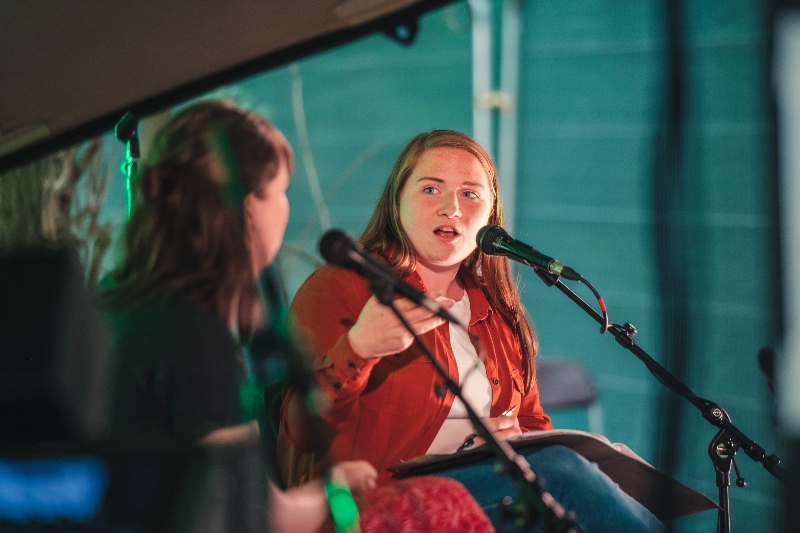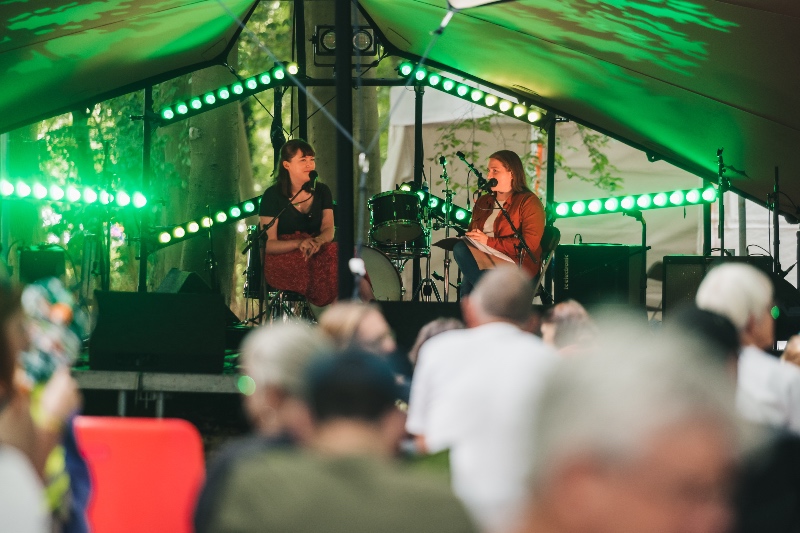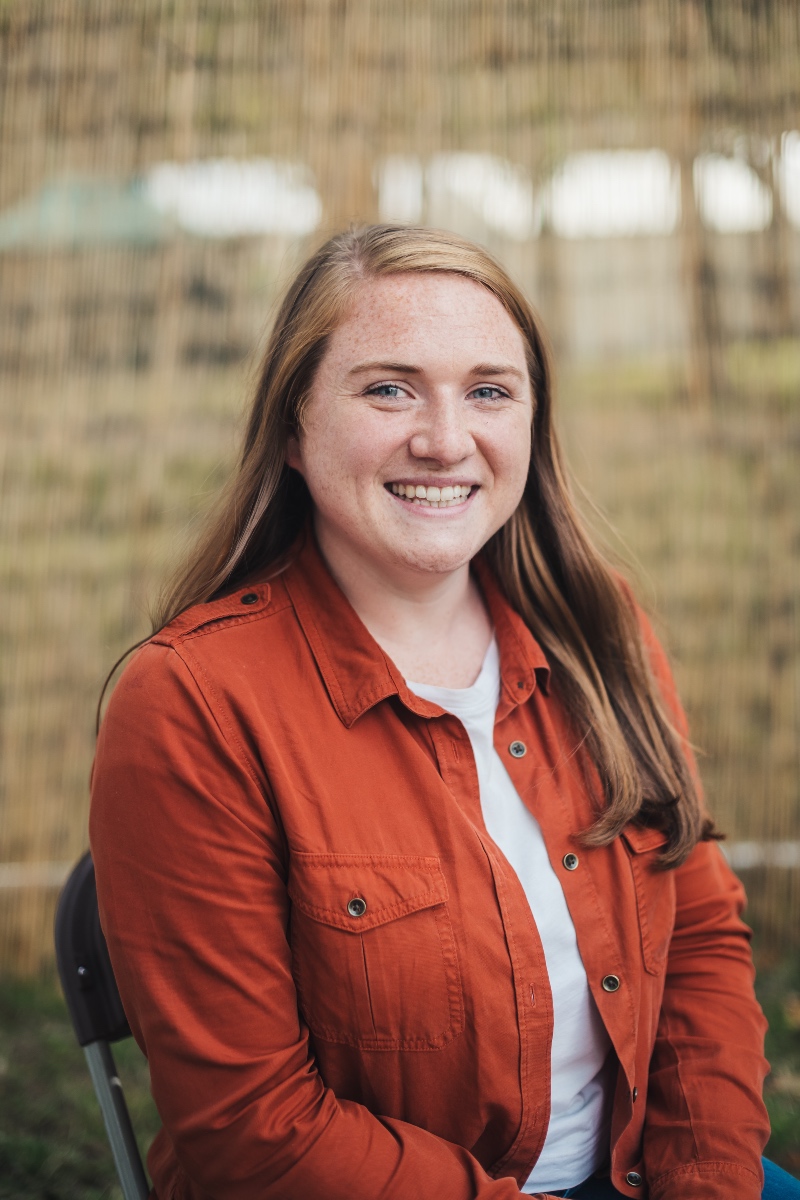'We have to be hopeful. But we have to be urgent'
Less Waste Laura (Laura Young) is a climate activist and environmental scientist. In a talk at this year’s Greenbelt, Laura "looked to the solutions we must adopt in the next crucial few years if we're going to bring the world back into beautiful equilibrium."
She spoke to The Baptist Times about what these solutions are, the role of faith in her activism, and the importance of young people in driving efforts to tackle climate change.
Interview and photos by Alex Baker

Can you talk us through some of the solutions we must adopt now and in the next crucial few years to tackle climate change?
I love this because it's it's just about less. You know, I often sit in spaces where people are talking about technological advances, new fashion materials, new ways of developing tech or this, that and the other. It's all shiny, it's new. But actually the solutions we need is just less. We need to be consuming less, producing less, wasting less, taking less out of the earth and putting more back in.
It's about reducing, and it comes out in loads of different ways.
I think for us as individuals, it means we need to want less stuff, be content with not always having a new wardrobe every year. We need to be content with getting a second-hand phone instead of always being in the queue for the newest iPhone or whatever the tech thing might be. Being content that our house might not always look that trendy, but our furniture is sturdy and it's shelter and it's good.
I think that also then moves up though, as governments we need to be thinking about not just how do we produce more good energy, but how do we make our homes and cars and buildings way more efficient so we're wasting less? They need to be thinking, right, how do we not need to pull down more forests to produce more food? We need to look at how we eat smarter and eat better and waste less.
And actually a lot of the solutions are just mindset shifts. You could slowly slip into the radical idea of, we need to be talking about a wellbeing economy, not economic growth, growth that is infinite. And we need to be talking about really looking at the system that we do things.
But often culture change is just about less. It's about sharing more. It's about circular economies. It's about all these policy changes that just create a different lens we look at the world through, and just think how we can make those tweaks. The biggest thing we're sold is, this is what you need to buy to be sustainable. That's an oxymoron. There's no way to buy sustainability. It just happens.

You've sat on the Public Theology Group for the Baptist Union of Scotland - what's the role both of denominations and churches in tackling environmental issues?
First and foremost is talking about it, getting it to be something that is regularly spoken about, whether that is just in chitter chatter in churches or through sermon series. And, you know, when we talk about what's the church's role, whether it's the role in the community, the role in ministering congregations, it is about saying actually just something: 'we talk about it'.
It can be something we wrestle with. We're not saying there's one correct answer to all these things, but actually if we can wrestle with these issues, I think that is really, really important.
I also think churches have got a responsibility to be sustainable, as buildings, as congregations, as individuals, to play their part. And I think there's a real need as well for Christians to be in all spaces, and the climate spaces where we need to have Christians most, for it can be a really hopeless environment. It can be all about doom and gloom and bad things. And there's not a lot of space for restoration and reconciliation and love and the gospel. The gospel that includes all things. All things. Including creation.
And so I think it's our role to make sure that we are both ministering to people who walk into our doors about these issues and wrestling with them and working out what we need to do, but also to be voices of hope in climate spaces.
And if nothing else, I've never been asked more about my faith than when I'm in climate rooms, because people ask, why are you interested in this? What's your passion? Where's your hope come from? And you get to talk about the hope of Jesus Christ. And that's something that we should be doing way more of.
If we avoid getting into these spaces, we avoid that opportunity to bring hope and reconciliation into those areas.
You seek to bring younger voices into influential spaces - why is it important for you to do this?
Diversity is always good. I think it just gives fresh perspectives, particularly with this issue though, it reminds us those who are going to be the most impacted. When we talk about climate, we need to be remembering that: one, there's people already impacted around the world. How are we hearing from them?
 But also, two, a lot of people in decision-making positions are not going to be around in 50 years time, let's be honest. And so we need to be having the young voices here. We have been experiencing changes to the environment for our whole lives, and have that urgency.
But also, two, a lot of people in decision-making positions are not going to be around in 50 years time, let's be honest. And so we need to be having the young voices here. We have been experiencing changes to the environment for our whole lives, and have that urgency.
But there's also just a unique directness of young people who haven't been corrupted by the system yet, if that's a bit of a radical thing to say. They just see the problem and think, why can't we fix it? Why are we getting tied up in politics and economics and business? Why don't we just do the right thing? And sometimes just having that voice in the room kind of resets everyone to say, 'Actually, yeah, we just need to stop getting tied up in knots and just take that action on.'
That's something only young people can bring. It's not saying they have all the solutions, but they are a huge part of the solution and the real catalyst for change.
What drives your advocacy? And how does your faith inform it?
Great question. I think my activism is driven by a bit of black and white thinking. I feel when I see something that's wrong, I just, it's black and white and, you know, that's not right. And we need to try and fix it. Whether that's something really small or really big, it's just quite a, okay, I've now got that itch. We need to just get moving. And I think that's kind of always been my thinking, which is hard because it means I don't often sit still with something that's a big problem, it can be difficult.
But my faith is a huge driver of what I do and why I do it, particularly in the niche of climate and climate justice. It's because I want to take care of the planet because we were given responsibility for it. And in the first book in the Bible, you can't read the Bible without bumping into that.
It's also because I want to love my neighbour, and when I see something that's happening that's impacting them, I want to do something about it because I want to love them. And that often means changing my lifestyle. Pushing for change means using my voice for those who often just don't get one.
I believe that God has a plan for restoration and we've been called to be a part of that reconciliation, and we need to play our part. And if he can give us Jesus, we can give him our lifestyles. And that's just the big, big driver for me.
It wasn't always that way. And it took a while to kind of make the connection between activism, justice and faith. But that happened, and it became the core reason why I do the kind of work that I do.
Are you hopeful we can tackle climate change, and reduce consumption and waste?
I am. I have to be. We have to be, because ultimately I'm in a luxury, privileged position that I'm not yet impacted by this. So I could sit and say, yeah, we've got time, we've got wherever, we've not got urgency.
But we do. We have to be hopeful. We have to be urgent because there are people impacted.
But I'm hopeful because we've got the solutions. We've got all the tech that we need. We've got the mindset that we need to get into. We just need to get into it. And it's all there. It's just, we need to get there. We just need to influence the right people. We need to bring people along with us. We need to have the conversations.
And actually, over the last few years, we've seen amazing change, although it isn't enough yet. We've seen it. We've made these decisions. We've made investments into green energy. We've started up businesses that are sustainable. We've got conversations and we've got resources. Like we've got all, we just need to be doing it a little bit faster.
But that's why I'm hopeful. You know, I often think about right before COVID and we were thinking about this virus. No one had any idea what it was. We didn't know how to tackle it. We didn't have a vaccine. It was quite a hopeless time because we just didn't know. We knew about similar things. We had scientists who could do it, but we just knew we needed to put everything into finding a vaccine, finding out how it spreads, finding out what we could do as individuals to make that change and obviously find out how we could lockdown to help.
And we did that and we all took action. We all did individual things. We had the scientists working all hours to make sure we had the vaccine and everything. And now, although we might not be in the clear, we are so much better, well informed and we've got so much more information. We can test. We can take the vaccine, we can wear a mask, we can stay away from events. But we have that information.
With climate, we've got it, we've got the "vaccine". We know what the solutions are. We know what we need to do. We've got the information and we know the individual actions we need to take, we just need to do it.
And that's why I'm hopeful, because it is a hopeful situation. We just need to get moving a bit quicker.
Laura lives an environmentally conscious lifestyle, advocating for environmental education and climate justice. Her social media platforms continue to grow, creating a community of activists. You can find her on Facebook, Instagram, Twitter, TikTok, and YouTube all under @LessWasteLaura.
Based in Scotland, Laura works for the international development charity, Tearfund, previously as the COP26 Coordinator. She now leads – “Let’s Change The Climate” – and runs the social media channels for Bin Twinning. Alongside professional experience she has a wide variety of voluntary positions, currently being one of the 2050 Climate Group, Scottish Wildlife Trust Young Leaders, and Marine Conservation Society Youth Ocean Network.
Seeking to bring younger voices into influential spaces, she also sits on a variety of boards and advisory committees. Since the beginning of 2021 she has sat on the Public Theology Group for the Baptist Union of Scotland, Diamonds Scotland’s board of trustees, is one of the Evangelical Alliance Scottish Public Leaders, and has taken part in the Christians in Media pilot mentorship programme.
Alex Baker is a former sub-editor and movie reviewer of The Baptist Times who now works as a photographer, videographer and designer www.alexbakerphotography.com
Do you have a view? Share your thoughts via our letters' page.
Baptist Times, 01/09/2022